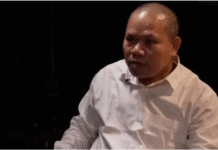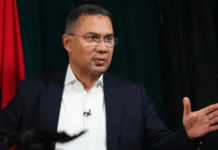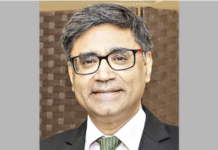CEC sees elections irregularities as inevitable
 Chief election commissioner KM Nurul Huda has been making all sorts of contradictory and ridiculous statements that we could have easily ignored, had he not been the head of a constitutional institution. He is responsible for conducting a free, fair and peaceful election.
Chief election commissioner KM Nurul Huda has been making all sorts of contradictory and ridiculous statements that we could have easily ignored, had he not been the head of a constitutional institution. He is responsible for conducting a free, fair and peaceful election.
The CEC has said that there can be no guarantee that the coming election will be free of irregularities. However, he assured that the election commission would take due measures if any irregularities cropped up. In other words, the head of the election commission is not interested in preventing the crime. He will act only after the crime is committed. And his assurance certainly has not allayed the apprehensions of the people to any extent at all.
Referring to the widespread irregularities and rigging in the recent elections to the three city corporations, journalists had asked the CEC if this would be repeated in the coming national elections. He virtually admitted that there would be irregularities in the election. It would be a gross understatement to term what happened in the city corporation polls as mere ‘irregularities’.
He said he took more measures in Barishal as more irregularities had occurred there. What were these measures? He suspended voting in 10 to 12 polling centres. That is the measure of his actions.
But what was the Barishal experience? Even before noon, supporters of the ruling party candidate took over the polling centres and stamped all the ballot papers. Polling agents of the opposition candidate were evicted from the centres. Five mayoral candidates boycotted the election from the afternoon. The people were taken aback by such a farce of an election. First and foremost, the commission must ensure a level playing field for all parties and candidates. They failed to do so before and during the election.
The CEC has spoken about irregularities during the election. But can the rampant stamping of ballot papers and evicting the opposition candidate’s polling agents from the centres merely be termed as ‘irregularities’? He has so long been maintaining that the elections would be hundred per cent free, fair and peaceful. And yet the five cities was a blatant rehearsal of widespread irregularities, rigging and forceful takeover of the polling centres. Now he says that the irregularities cannot be entirely controlled. If so, why have an election commission at all? Wherever the candidates have the muscle power, they can simply take over the centres and declare themselves the victors.
Whatever credibility the election commission had gained by conducting more or less fair elections in Cumilla and Rangpur, has all been lost in the farcical elections of the five cities. The people were not just disappointed at the commission’s performance, they were angry too. Elections were considered to be festivals in Bangladesh, but now are a source of fear. This cannot prevail.
The election commission took oath and are constitutionally committed to the people to carry out their constitutional responsibilities. We want to remind the commission of their commitment. If an election environment can be created and fear can be dispelled from the voters’ minds, then there will be no need to worry now about the irregularities after the election is over.









